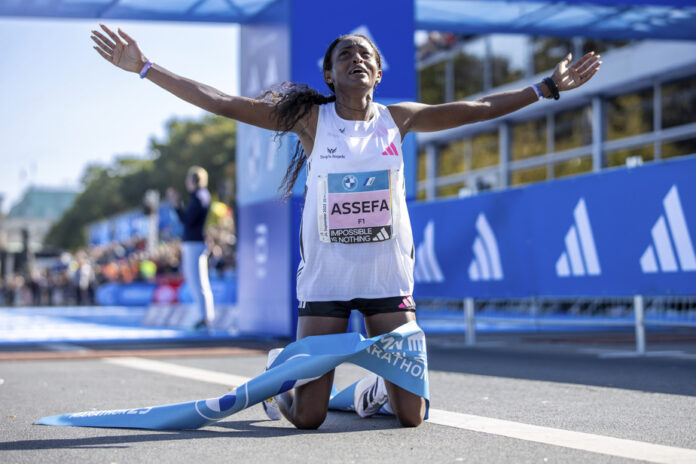(Berlin) A stratospheric performance: for her third completed marathon, Ethiopian Tigst Assefa wrote a page in athletics history, improving the women’s world record by more than two minutes to 2:11:53, a jump not seen in over 40 years.
With this time, the fifth victory – also historic – of Eliud Kipchoge under the Brandenburg Gate is relegated to the background, the Kenyan nevertheless overtaking the Ethiopian Haile Gebrselassie in the list of fastest marathon on the planet.
In September 2022, when all eyes were on Kipchoge’s world record of 2:01:09, 26-year-old Tigst Assefa had already caused a sensation under the Brandenburg Gate for his second marathon with a time of 2:15:37, at the time the third fastest time in history and the best mark on the streets of Berlin.
On Sunday, she put away Brigid Kosgei’s world record of 2:14:04, which the Kenyan set just under three years ago in Chicago. Such a progression of more than two minutes between two world records has been unprecedented since 1983.
For comparison, the Ethiopian ran faster than her legendary compatriot Abebe Bikila, who set the men’s world record in 1964 in Tokyo, during his second Olympic title, the one he won with shoes after won barefoot in Rome four years earlier.
“I didn’t expect to run that fast, to go under 2:12,” Assefa admitted. “But it’s the result of hard work. »
Arriving in athletics via track, she first specialized in the 800 meters, with a personal best achieved in July 2014 in Lausanne in 1:59.24.
She qualified for the Rio Olympics in 2016 without making it out of the heats, before an Achilles tendon injury forced her to switch to the road, with her first races in 2018 over 10 kilometers, before to take up the half marathon and set a record of 1:07.28 in Germany in 2022, which did not place her in the top 50 performances that season.
With the COVID-19 pandemic, Assefa decided not to run and embarked on her first marathon in March 2022 in Riyadh, which she completed in 2:34:01. In the space of 18 months, she therefore improved her time over 22 minutes.
With this performance, the athlete who trains on the heights of Addis Ababa (2,300 m above sea level) places herself as one of the big favorites for Olympic gold in Paris in just over ten months, on a route, however, very hilly and totally different from that of Berlin, which is completely flat.
The 2024 Games remain Eliud Kipchoge’s ultimate goal, where he hopes to overtake Bikila by achieving an unprecedented Olympic hat-trick. On Sunday, the 38-year-old Kenyan reassured himself, five months after his failure in Boston (sixth in the race in 2:09:23, more than three minutes behind the winner).
Starting at a very high pace again (for around fifteen kilometers in times of less than two hours), Kipchoge certainly did not improve his world record but nevertheless won for the 5th time in Berlin.
In 2:02:42, he ran the eighth-fastest marathon in history (he holds five of the eight fastest times over 26.195 miles).
“Of course I was hoping to set a new world record, but I can live with the fact that it didn’t work out,” Kipchoge commented after his race.
The challenge of the Olympic hat-trick promises to be perilous, with intensifying competition, embodied by the emergence of his young compatriot Kelvin Kiptum, 23, who came within 16 seconds of Kipchoge’s world record in London in April, and who will be at the start of the Chicago Marathon on October 8.















